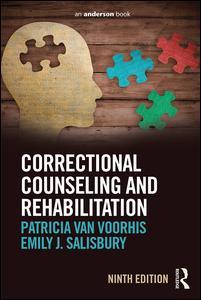Description
Correctional Counseling and Rehabilitation (9th Ed.)
Authors: Van Voorhis Patricia, Salisbury Emily J.
Language: English
Subjects for Correctional Counseling and Rehabilitation:
Keywords
Offend Ers; Corrections; Recidivism; Intervention; Recidiv Ism; Client services; Respons Iv Ity; System-involved; American Psychiatric Association; Rehabilitation; Crim Inal Justice Agen Cies; Probation; Respons Ib Il Ity; Prison; Thera Peutic Rela Tion Ship; Treatment; Struc Ture; Counseling; Admin Istered; Parole; Proba Tion; Therapy; Treat Ment; Change agents; Correc Tional Agen Cies; Human services; Psycho Dy Namic; Assessment Diagnosis; Correctional Counseling; Classification; Sex Offend Ers; Case planning; Relapse Preven
Approximative price 80.97 €
In Print (Delivery period: 14 days).
Add to cartPublication date: 05-2016
· Paperback
Approximative price 244.87 €
In Print (Delivery period: 14 days).
Add to cartPublication date: 05-2016
· 19.1x23.5 cm · Hardback
Description
/li>Contents
/li>Biography
/li>
Correctional Counseling and Rehabilitation, 9th ed., presents foundations of correctional intervention, including overviews of the major systems of therapeutic intervention, diagnosis of mental illness, and correctional assessment and classification. Now fully updated to reflect DSM-5, its detailed descriptions and cross-approach comparisons help students prepare for a career in correctional counseling and allow working professionals to better determine which techniques might be most useful in their particular setting.
The content is divided into five parts: (1) A Professional Framework for Correctional Counseling; (2) Understanding the Special Challenges Faced by the Correctional Counselor in the Prison Setting; (3) Offender Assessment, Diagnosis, and Classification; (4) Contemporary Approaches to Correctional Counseling and Treatment, (5) Interventions for Special Populations, and (6) Putting It All Together. The book is appropriate for upper-level undergraduates and graduate students in Criminal Justice and Criminology, Psychology, and Social Work programs as well as correctional counseling practitioners.
PART 1. A Professional Framework for Correctional Counseling, 1. The Process of Correctional Counseling and Treatment , 2. Understanding the Special Challenges Faced by the Correctional Counselor in the Prison Setting, PART 2 Historical Foundations of Correctional Counseling and Treatment, 3. Psychoanalytic Therapy, 4. Radical Behavioral Interventions, 5. Early Approaches to Group and Milieu Therapy, PART 3 Offender Assessment, Diagnosis, and Classification, 6. Diagnosis and Assessment of Offenders, 7. An Overview of Offender Classification Systems, PART 4 Contemporary Approaches to Correctional Counseling and Treatment, 8. Social Learning Models, 9. Cognitive Therapies , 10. Family Therapy, PART 5 Effective Correctional Interventions for Special Populations, 11. Treating Substance Abuse in Offender Populations, 12. Treating Sexual Offenders, 13. Treating Severely Antisocial and Psychopathic Offenders, 14. Treating Women Offenders, PART 6 Putting it All Together in Correctional Policy and at the Desk, 15. Correctional Treatment: Accomplishments and Realities, 16 Case Planning and Case Management,
Patricia Van Voorhis, Ph.D., is Professor Emerita of Criminal Justice at the University of Cincinnati. Van Voorhis has published extensively, including two books and many articles in the leading criminology and criminal justice journals. She has provided expertise to federal, state, and local agencies on topics pertaining to correctional effectiveness, program implementation, evaluation techniques, women offenders, risk assessment, and correctional classification. She has directed numerous federal- and state-funded research projects on inmate classification, gender-responsive assessment, program implementation, cognitive-behavioral interventions, and continues to pursue a rigorous consulting and research agenda in retirement. Van Voorhis is the recipient of many awards, including the prestigious American Society of Criminology August Vollmer Award, which recognizes a criminologist whose research scholarship has contributed to justice or to the treatment or prevention of criminal or delinquent behavior.
Emily J. Salisbury, Ph.D., is an Associate Professor of Criminal Justice at University of Nevada, Las Vegas. Salisbury is the Editor-in-Chief of the peer-reviewed, academic research journal, Criminal Justice and Behavior. Her primary research interests include correctional assessment and treatment intervention strategies, with a particular focus on female offenders and gender-responsive policy. She was the project director of two research sites that developed and validated the Women’s Risk/Needs Assessment instruments (WRNAs) through a cooperative agreement with the National Institute of Corrections and the University of Cincinnati. Her research publications have appeared in several top academic journals, as well as practitioner-oriented newsletters and book chapters.




